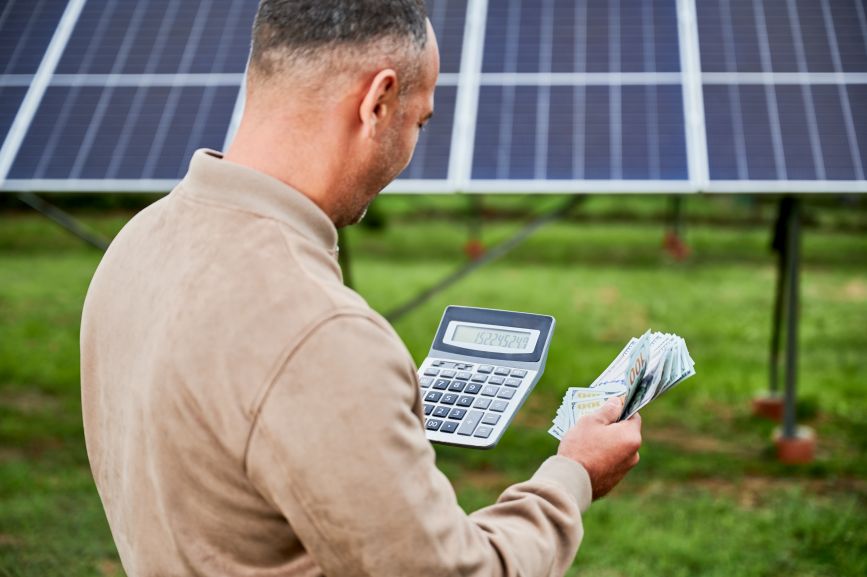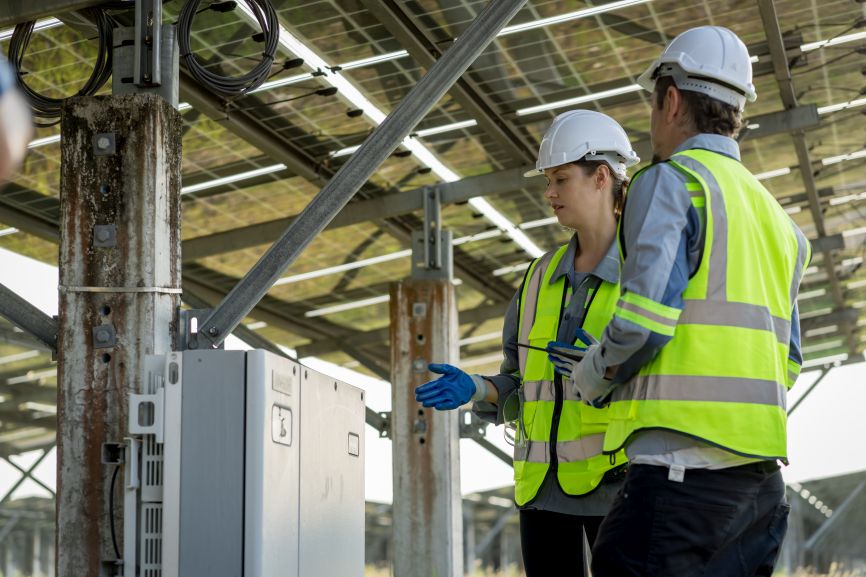The Truth Behind Your Sky-High Electric Bill — And What You Can Do About It
Have you noticed your electricity bill creeping up every month?
You’re not imagining things — if you live in Massachusetts, you’re paying some of the highest energy rates in the entire country. And with utility hikes from companies like National Grid and Eversource, it’s only getting worse.
Now imagine this instead:
- What if you could cut your monthly electric bill by 50% or more?
- What if those savings grew every year, just as rates go up?
- And what if — in the process — you locked in decades of predictable energy costs, boosted your home’s value, and claimed thousands of dollars in federal and state tax credits?
This isn’t a fantasy. It’s what thousands of smart Massachusetts homeowners are already doing by going solar — and in 2025, the opportunity is bigger than ever.
The numbers speak for themselves. Between the 30% Federal Solar Tax Credit, the $1,000 Massachusetts State Credit, SMART program payouts, and net metering benefits, most homeowners cut their out-of-pocket system costs by up to 50% — and start saving $1,200 to $1,800 a year.
But this isn’t just about money. It’s about freedom.
Freedom from unpredictable utility bills.
Freedom from grid dependency.
Freedom to invest in something that actually pays you back.
In this guide, you’ll discover exactly how much solar panels can save you in Massachusetts, how the numbers stack up in Worcester and beyond, and how to claim every available credit, rebate, and return.
Ready to see what your solar savings could look like?
Get Your Free Solar Estimate Here
The Real Cost of Electricity in Massachusetts (And Why It’s Rising Fast)
Before you can understand how much solar can save you, it’s critical to grasp how much you’re actually paying for electricity in Massachusetts — and why it’s so high.
According to the U.S. Energy Information Administration (EIA), the average Massachusetts household pays about $0.25 per kilowatt-hour (kWh) — well above the national average of ~$0.17/kWh. For a typical home using 600–800 kWh per month, that translates to a monthly electric bill of $150 to $200 or more.

Why Are Massachusetts Electric Rates So High?
Several factors contribute to the sharp cost of electricity in the state:
- Natural gas dependency: New England’s grid still relies heavily on natural gas, and global fuel price shocks directly impact your utility rates.
- Aging infrastructure: Utilities like National Grid and Eversource are passing on infrastructure upgrade costs to consumers.
- Weather volatility: Harsh winters and hot summers lead to demand spikes — and price hikes.
- Delivery charges: Many Massachusetts homeowners are surprised to learn that “supply” is only half the bill — the rest goes to delivery and grid maintenance fees.
Worcester residents, in particular, are feeling the heat. Data shows some of the highest average residential electric bills in Central Massachusetts, especially in older homes with electric heating or inefficient systems.
What This Means for You
These rates aren’t going down anytime soon. In fact, Massachusetts has consistently seen year-over-year utility rate increases, with National Grid forecasting double-digit spikes in certain regions.
If you’re still 100% reliant on the grid, your electric bill will continue to rise — and your control over it will continue to shrink.
That’s why solar is more than just an energy upgrade. It’s a financial hedge against rising utility costs, and the first step toward locking in predictable, lower bills for decades to come.
How Much Do Solar Panels Really Save in Massachusetts?
Now for the question every homeowner wants answered:
How much money can you actually save by going solar in Massachusetts?
The answer depends on your system size, energy usage, and incentive eligibility — but let’s start with the typical scenario for a Massachusetts homeowner.
Sample Savings Scenario (Worcester-Based Home)
Let’s say you own a single-family home in Worcester, MA and install a 6.5 kW solar system, which is average for this region.
System Cost (Before Incentives): $24,000
Federal Solar Tax Credit (30%): –$7,200
Massachusetts State Tax Credit (15%, capped at $1,000): –$1,000
SMART Program Payout (10 Years): –$7,000 (est.)
Mass Save Battery Rebate (if installed): –$1,000 to –$2,000
- Final Out-of-Pocket Cost: ~$7,000 to $8,000
- Annual Energy Bill Savings: $1,400 to $1,800/year
- Payback Period: 4–6 years
- 20-Year Savings: $35,000 to $45,000+
And that’s assuming utility prices stay where they are — which, as we covered earlier, they won’t.
Savings with and without Solar in 2025
| Year | With Solar | Without Solar | Annual Difference |
|---|---|---|---|
| 1 | $300 | $1,800 | $1,500 |
| 5 | $1,500 | $9,600 | $8,100 |
| 10 | $3,000 | $20,000+ | $17,000+ |
| 20 | $6,000 | $42,000+ | $36,000+ |
Even after factoring in the system cost, solar starts paying for itself in 4–6 years and keeps saving you money for decades.

Do Solar Panels Eliminate Your Electric Bill in Massachusetts?
Not entirely — but they can reduce your bill by 75% or more.
Massachusetts uses net metering, which credits you for extra energy your panels send to the grid. During sunnier months, you may produce more than you use, offsetting your bill. At night or in winter, you’ll draw from the grid — but you’ll often have credits banked.
Average monthly bill after solar in Massachusetts?
$25–$50, depending on usage and battery storage.
What About Small Homes or Low Electricity Users?
Even if you don’t use a lot of electricity, solar can still be worth it.
- Smaller homes require smaller systems, which cost less
- Incentives still apply regardless of usage
- If you ever sell your home, buyers value owned solar systems with locked-in savings
Worcester Homeowners: Here’s What to Expect
Many of our clients in Worcester — from neighborhoods like Burncoat, Tatnuck, and Lake Avenue — report:
- Bill reductions of 70–85%
- ROI timelines of 4–5 years
- Tens of thousands saved over 20+ years
With local programs like Mass Save, net metering, and SMART incentives active in Central Massachusetts, Worcester residents are uniquely positioned to maximize their savings.
Ready to see your personalized solar savings?
Get a custom savings estimate based on your home’s roof, electricity usage, and available incentives. It only takes 60 seconds, and there’s no pressure — just real numbers.
Request your free solar quote here
What Factors Influence How Much You Save with Solar in Massachusetts?
Not all solar systems are created equal — and neither are the savings.
While federal and Massachusetts solar incentives provide a huge head start, several personal and environmental factors ultimately shape your actual return on investment. Here’s what determines how much money you can save by going solar in the Bay State.
1. Your Roof’s Sun Exposure & Orientation
Solar panels thrive on sunlight. The more direct sun your roof receives, the more energy your system will generate — which translates to more savings.
In Massachusetts, south-facing roofs with a tilt angle between 30–45° are ideal. But east- and west-facing roofs can also produce excellent results, especially when combined with net metering and battery storage.
Shaded roofs? You may still qualify — especially with microinverter systems or ground-mounted panels.
2. Your Current Electricity Usage and Rates
If your electric bill is over $100/month, solar is almost always worth it.
Massachusetts has some of the highest utility rates in the U.S., with providers like National Grid and Eversource steadily increasing prices. The more you pay for electricity now, the more you’ll save over time with solar.
Tip: You can use your current utility bill to estimate savings with a tool like PVWatts, or get a custom estimate from our team here.
3. The Incentives and Rebates You Qualify For
Your savings will also depend on your eligibility for programs like:
- The 30% Federal Solar Investment Tax Credit (ITC)
- The 15% Massachusetts Residential Energy Credit (up to $1,000)
- The SMART Program for performance-based payouts
- Mass Save rebates for battery and hot water upgrades
The good news? Most homeowners in Worcester and across Massachusetts qualify for all of these.
But some — like SMART — have limited capacity blocks that fill up over time. That’s why when you go solar can matter just as much as if you go solar.
4. Whether You Include Solar Battery Storage
Adding solar battery storage (like Tesla Powerwall or Enphase) does increase upfront costs — but it can boost your long-term savings by:
- Reducing your reliance on grid power at night
- Protecting against outages
- Qualifying you for Mass Save rebates and SMART bonuses
If you’re concerned about utility instability or want more energy independence, a solar battery could make financial sense — especially with Massachusetts’ growing storage incentives.
5. Home Size and System Capacity
The size of your solar system (measured in kilowatts, or kW) affects both the cost and potential savings. A larger home with higher energy needs may require an 8–10 kW system, while smaller households might only need 5–6 kW.
Remember: both federal and state tax credits are percentage-based — so bigger systems often unlock bigger dollar-value incentives.
Bottom Line?
Your solar savings in Massachusetts will be shaped by:
- Where you live
- How much you spend on electricity
- What rebates and credits you claim
- Whether you add battery storage
- The timing of your installation
Want a clear picture based on your situation? Tap below for a free, no-pressure quote from our team:
Calculate your solar savings now

Solar Panels as a Long-Term Investment — ROI & Property Value in Massachusetts
When most homeowners think about going solar, they focus on the monthly savings — and that’s completely fair. But what often gets overlooked is the long-term return on investment (ROI) and the increase in home value solar can deliver.
Here in Massachusetts — where electricity costs are high and solar incentives are generous — the payoff is among the best in the country.
Let’s break it down.
How Quickly Can Solar Panels Pay for Themselves?
The average payback period for a residential solar system in Massachusetts is between 5 to 7 years. After that, your system keeps generating free electricity for another 18–25 years or more — all while increasing your home’s resale value.
Let’s run a simple example:
- System cost after incentives: $8,500
- Annual electric bill savings: $1,500
- SMART Program payments (10 years): $6,000–$7,000
You recoup your investment within 6 years — and generate thousands in net savings over the next two decades.
How Much Does Solar Increase Home Value in Massachusetts?
According to Zillow, homes with solar panels sell for 4.1% more on average across the U.S.
In Massachusetts, where buyers actively seek out energy-efficient homes, this premium can be even higher.
For a $450,000 home, 4.1% translates to $18,450 in added resale value — sometimes even more if the system is new, owned (not leased), and includes battery backup.
Why buyers love solar homes:
- Lower monthly energy bills
- Predictable electric costs
- Modern appeal and environmental benefits
- Solar systems are often warrantied for 25 years or more
Solar ROI in Massachusetts vs. Other States
Thanks to the combination of:
- High utility rates
- Aggressive incentives
- Net metering
- The SMART program
… Massachusetts consistently ranks among the top 5 states in the U.S. for solar return on investment.
That means every dollar you spend on solar here can deliver greater payback than in sunnier but less-incentivized states like Texas or Florida.
And It’s Not Just ROI — It’s Equity
Unlike other home upgrades (like a kitchen remodel), solar doesn’t just look nice — it creates measurable financial value.
By reducing your operating expenses (i.e., utility bills), solar panels increase your home’s net operating income (NOI) — which appraisers and buyers factor into their offers.
Better yet? In Massachusetts, solar panels don’t increase your property tax thanks to a full exemption for renewable energy systems.
The Takeaway:
Going solar in Massachusetts isn’t just a feel-good environmental move — it’s a strategic financial investment that delivers:
- Fast payback
- Ongoing energy savings
- Increased resale value
- Tax-exempt added equity
Ready to find out what solar could do for your home’s value?
Get a free solar quote with ROI breakdown

Real Savings Scenarios – How Much Do Solar Panels Save in Massachusetts?
Let’s take everything we’ve covered — the rebates, credits, SMART payments, and net metering — and put it into real numbers. Below are three sample scenarios showing how much solar panels can save in Massachusetts depending on home size, usage, and location.
These examples are based on current incentive rates, realistic energy use, and system costs in 2025.
Scenario 1: The Average Massachusetts Home
- Home Location: Worcester, MA
- Monthly Electricity Bill: $160
- System Size: 6.5 kW
- System Cost (before incentives): $24,000
- Federal Tax Credit (30%): –$7,200
- MA State Tax Credit (15% up to $1,000): –$1,000
- SMART Incentive (10 years): –$6,500
- Net Metering Credits: ~$700/year saved
- Final Net Cost: ~$9,300
- Annual Energy Bill Savings: ~$1,700
- Breakeven Point: ~5.5 years
- 20-Year Savings: $25,000–$32,000+
Scenario 2: Larger Home With Battery Storage
- Home Location: Suburban Boston
- Monthly Electricity Bill: $250
- System Size: 9.5 kW with battery
- System Cost (before incentives): $35,000
- Federal ITC (30%): –$10,500
- MA State Tax Credit: –$1,000
- SMART Program (including battery bonus): –$9,000
- Mass Save Battery Rebate: –$1,500
- Net Metering Savings: ~$1,100/year
- Final Net Cost: ~$13,000
- Annual Energy Bill Savings: ~$2,200
- Breakeven Point: ~6 years
- 25-Year Savings: $50,000+
Scenario 3: Low-Income Household With Solar Incentives
- Home Location: Springfield, MA
- Monthly Electricity Bill: $100
- System Size: 4 kW
- System Cost (before incentives): $15,000
- Federal ITC (30%): –$4,500
- MA State Tax Credit: –$1,000
- SMART Bonus for Low-Income Tier: –$5,000
- Final Net Cost: ~$4,500
- Annual Bill Savings: ~$1,100
- Breakeven Point: ~4 years
- 20-Year Net Savings: $18,000+
Key Takeaways
- Most Massachusetts solar systems break even in 4–7 years
- Savings increase dramatically with smart program stacking
- Lower-income households can qualify for enhanced SMART benefits
- Battery storage can unlock even more rebates and backup power security
If you’re asking “How much can solar panels save me in Massachusetts?” — the answer lies in your home, your usage, and your ability to claim these incentives.
Curious about your numbers?
Get a free solar savings estimate for your home
FAQs and Misconceptions About Solar Savings in Massachusetts
Even with generous solar incentives, it’s normal to have questions — and some hesitation. Let’s break down the most common concerns Massachusetts homeowners have when it comes to solar panel savings.
Is solar worth it in Massachusetts even with the weather?
Yes — Massachusetts might not be as sunny as Arizona, but it still averages over 200 sunny days per year. Thanks to high electricity rates, strong net metering, and generous tax credits, Massachusetts is consistently ranked one of the top states where solar pays off fast — often in under 6 years.
What if my energy usage is low?
Even modest energy users can benefit. Smaller systems cost less and still qualify for federal and state solar incentives. Plus, excess energy can be sold back to the grid via net metering, further increasing your returns. You don’t need a huge roof or massive bill to make solar savings worthwhile.
What happens on cloudy days or in winter?
Your system will still generate energy, just at a lower output. In summer months, you’ll typically produce more than you need — those extra credits roll over and help cover your winter usage. Solar panels in Massachusetts are designed to perform efficiently in all seasons.
Aren’t solar panels expensive upfront?
They used to be. But today, federal tax credits, state rebates, and SMART payments can cut your cost by 50% or more. Plus, low-interest solar loans or $0-down financing makes it affordable for nearly anyone — with many homeowners seeing instant bill reductions.
What if I sell my home?
Good news — homes with solar panels sell faster and for more money. According to Zillow, solar homes can sell for up to 4.1% more. Plus, Massachusetts law ensures solar systems are exempt from property tax increases.
Still have questions?
We get it — this is a big decision. That’s why we offer expert, no-pressure guidance to walk you through it.
Get your personalized solar savings estimate today
The Smartest Financial Move You Can Make in 2025
If you’ve made it this far, one thing is clear — going solar in Massachusetts isn’t just good for the environment. It’s a strategic, long-term financial decision that can transform your utility bill, increase your property value, and give you peace of mind for decades.
Let’s recap what you stand to gain in 2025:
- A 30% federal solar tax credit that puts thousands back in your pocket
- Up to $1,000 in Massachusetts state income tax savings
- Monthly SMART payments for producing clean energy
- Net metering credits that slash your electric bill
- Rebates from Mass Save for batteries and hot water systems
- All while avoiding property tax increases on your home’s added value
And if you’re in Worcester or anywhere across Central Massachusetts, you’re perfectly positioned to take advantage of every incentive available.
Solar savings are no longer a mystery. They’re real. They’re accessible. And they’re yours to claim — if you act.
Whether you’re just researching or ready to take the next step, we’re here to guide you through it all.
Let’s unlock your solar savings together
Take 60 seconds to see what solar could save you — no pressure, no sales pitch, just real numbers.
